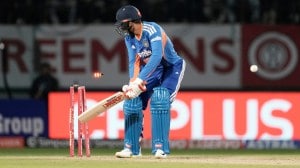JEE Main 2024: Tips and tricks to ace Physics, Chemistry, Mathematics
Achieving a perfect 100 or a maximum score in JEE Physics, Chemistry, and Mathematics is a challenging but attainable goal. Check tips to ace your JEE Main 2024.
 JEE Main is a critical examination with questions of various difficulty levels. (Representative image. Source: Pixabay)
JEE Main is a critical examination with questions of various difficulty levels. (Representative image. Source: Pixabay) — Ajay Sharma
Numerous students around India experience a turning point when they take the Joint Entrance Examination (JEE). JEE is essential to get admission in the Indian Institute of Technology (IITs), the National Institutes of Technology (NITs) and IIITs.
JEE Main is a critical examination with questions of various difficulty levels. Scoring well in Physics, Chemistry, and Mathematics is essential for getting a high-ranked college and a branch of your choice. These subjects collectively form the core of JEE, and excelling in these enhances the chances of securing admission to top institutions.
Physics, Chemistry, and Mathematics carry equal weightage in JEE Main. Each subject presents single correct (MCQs) and mumerical-based questions, making a perfect score of 300 challenging. However, if you have the right guidance with proper commitment and accuracy, it’s an achievable feat.
Strategy for scoring maximum in JEE Physics
Understanding the syllabus and exam pattern: The first step of this process involves getting an idea of the syllabus and exam pattern. It is essential to go through the previous year’s questions to understand the type of questions asked from every chapter. The weightage of the chapters is also essential when we are targeting a complete 100.
Building Strong Foundation Concepts: A basic understanding of Physics is very important for scoring a perfect score. Understanding these concepts’ fundamental principles, laws, and visualisations is paramount. In Physics, you will not find much theory to remember, but you will find beautiful concepts which can be framed in unique questions.
Regular practice and solving previous year’s papers: If you are a JEE aspirant targeting a perfect physics score, you must attempt at least 30-40 questions daily. Some books like H C Verma and D C Pandey are highly recommended. Previous year questions are the best tool to get an idea of what type of questions are asked in JEE and the difficulty level of exam questions. From 2019 to 2023, JEE Main has conducted more than 100 papers. In each paper, students will find 30 questions of Physics, so you have a bucket of more than 3,000 questions for practice.
Guidance and support from experienced faculty: Experienced teachers can provide valuable insights and clarification on complex topics, reducing confusion and boosting your confidence. Sometimes, these faculties will guide you as your mentor and help you when your performance declines.
Strategies for Scoring the maximum in JEE Chemistry
Mastering the three branches of Chemistry:
Organic Chemistry: For organic, don’t study reactions in isolation. Focus on all the possible reagents that can be used for a particular transformation process. For example, if you want to convert an Alcohol to an Aldehyde, consider all the reagents that can do this transformation. Discuss the same with your peer group. Note down the different reagents they have mentioned. Once this is done, move on to a further transformation. Also, study all the oxidising and reducing agents in a single run. That way, you can differentiate between all the reagents, their uses, limitations and applications.
Inorganic Chemistry: This is something which needs a lot of memorisation. As stated in my previous article, Inorganic should be revised in the scientific method of memorisation, Spaced Repetition. Also, Qualitative Analysis and bonding are two key topics which form the base of Inorganic. You should understand these topics in depth and find different ways of memorising and understanding the reactions. For example, flashcards, mnemonics, and reaction charts (on your home wall) are some ways to remember Inorganic reactions.
Physical Chemistry: JEE aspirants don’t find much difficulty in Physical chemistry. For example, Thermodynamics and Equilibrium are a few critical chapters that require a good understanding. Practicing a lot of questions in Physical chemistry is the key. In Surface chemistry, students seldom make mistakes as it is more of a theoretical chapter. Read this chapter carefully and read between the lines of NCERT.
Some other important chapters are Environmental Chemistry, and Chemistry in Everyday Life. These are the two chapters in which students generally make mistakes. So, if a student targets a perfect 100, they should not leave this chapter.
Sometimes, 2-3 questions are asked in a single paper from these chapters.
Strategies for scoring maximum in JEE Mathematics
Developing a deep understanding of mathematical concepts: Rote learning won’t suffice in Mathematics. It’s crucial to understand the underlying principles of each topic. Whenever you are going through a topic, dive deeper and think about how that question can be asked.
Extensive problem-solving and practice: Maths doesn’t have a lot of theory; maybe there are few formulas and theorems. But the most crucial thing in Maths for JEE is speed, which can only be mastered by practising many questions. The more you practice, the stronger you get, the more you have confidence while solving questions in JEE.
Maintaining consistency in mathematical practice: Sometimes, we have observed while dealing with many students that they have a strong passion at the beginning of the session, and they solve and practice many questions at that time. But after some time, as the syllabus proceeds, students lose interest and avoid solving questions. That is the worst thing to do in JEE preparation. You must not burn out at the beginning and keep solving the questions constantly during your whole preparation phase.
Strategies for exam day
Read the questions carefully: This point is the most important among the above-mentioned points. We have worked hard on everything for the JEE exam, but on exam day, we make silly mistakes by not reading the questions carefully. Some of the silly mistakes that we generally encounter are:
(a) Incorrect is misread by students as ‘correct’
(b) Sometimes, the student marks the first statement without reading all the options… And the last statement states that Statements 1 and 2 are correct.
(c) Sometimes, we miss an important value that needs to be used while solving the question
Revisit the paper/ doubtful questions: It is very important that if we have time, we should revisit the questions again. In case of less time, at least try to revisit those questions you have solved in a bit of a hurry, as the paper has negative marks, and each mark matters in the exam.
In conclusion, achieving a perfect 100 or a maximum score in JEE Physics, Chemistry, and Mathematics is a challenging but attainable goal. It requires dedication, hard work, and the right guidance. Strategise your preparation and work on your accuracy and speed. The path to perfection begins with a single step, and with the right support, you can turn your dreams into reality.
(The writer is the National Academic Director, Engineering at Aakash BYJU’S)
- 01
- 02
- 03
- 04
- 05































